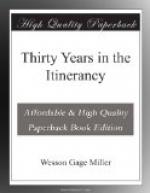CHAPTER I.
Providential Intervention.—Nature and Providence alike Mysterious.—An Unseen Hand shaping Human Events.—The Author urged to enter the Ministry.—Shrinks from the Responsibility.—Flies to Modern Tarshish.—Heads for Iowa.—Gets Stuck in the Mud.—Smitten by a Northern Gale.—Turns Aside to see the Eldorado.—Finds Himself Face to Face with the Itinerancy.
The ways of Providence are mysterious. And how, to men, could they be otherwise? With their limited faculties it could not be expected that they would be able to obtain more than partial glimpses of the “goings forth of the Almighty.” The Astronomer can determine the orbit of the planets that belong to our system, since they lie within the range of his vision; but not so the comets. These strange visitors locate their habitations mainly in regions so remote from the plane of human existence that his eye cannot reach them. And when they do condescend to pay us a visit, they traverse so wide a circuit that the curve they describe is too slight to furnish a basis for reliable mathematical calculations. Hence the orbit of a comet is a mystery, and the return not unfrequently a surprise. If this be true of what seem to be the unfinished or exploded worlds, that swing like airy nothings in the heavens and fringe the imperial realm of physical being, then what may not be predicated of the profounder mysteries that lie bosomed in those unexplored depths of the Universe, where the fixed stars hold high court? When our feet trip at every step of our advance to know the mysteries of nature, why need we affect surprise when the profounder domain of providence refuses to yield up its secrets? That the ways of God are mysterious is a logical necessity. The Infinite disparity between the human and the Divine intelligence involves it. Insignificant as a lady’s finger ring may seem when compared to one of the mighty rings of Saturn, the human mind, in the presence of the Divine, is infinitely more so. Well hath the Scriptures said, “Far as the heavens are higher than the earth, so are my ways higher than your ways, and my thoughts than your thoughts.”
The mysterious ways of Providence are, however, not unfrequently so interwoven with human events as that average intelligence may be able to understand portions of them, though much of mystery must always remain. And in no one particular do these understandable portions find a clearer illustration than in those interventions which assign individual men to given pursuits and responsibilities in life. Truly, “There is a Providence that shapes our ends, rough hew them as we will.”




